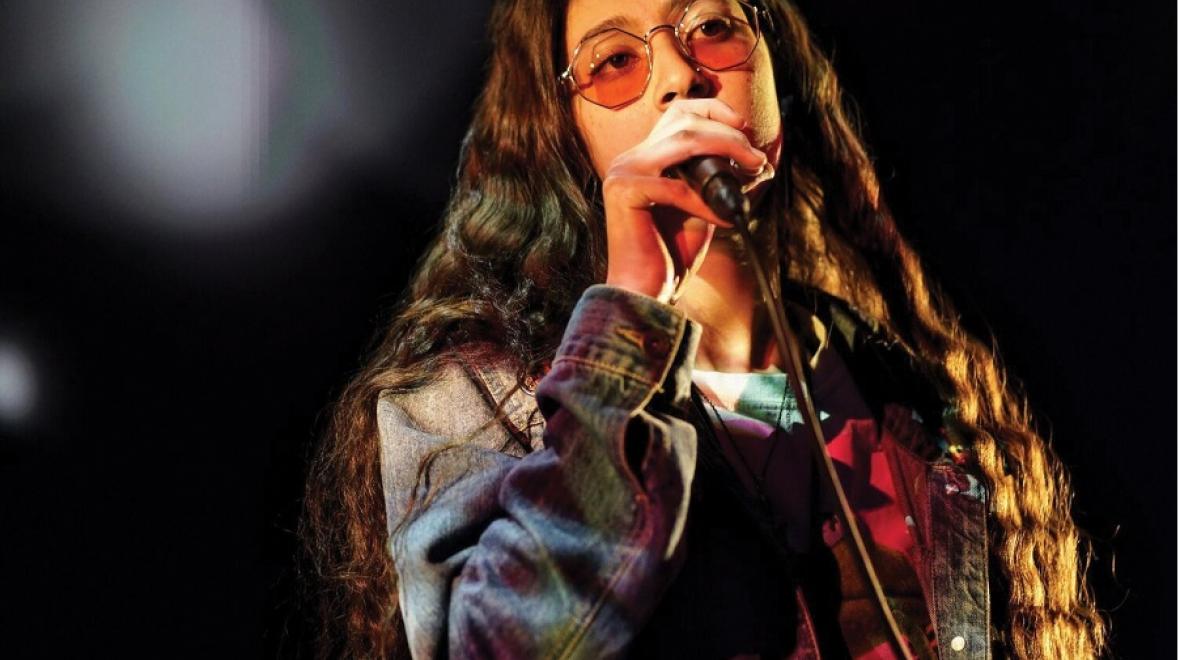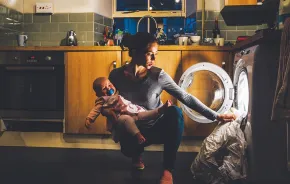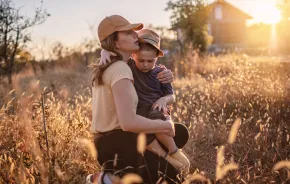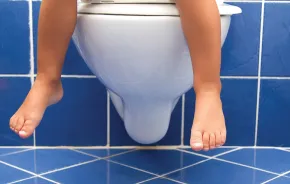
Photo:
Mirabai Kukathas (mirabaikukathas.com)
Editor's note: This article was sponsored by the Gates Foundation Discovery Center.
Parents aren’t always supportive of their kids’ dreams to become famous musicians. Not only does success seem unlikely, but the music industry is infamously cutthroat and often glamorizes self-destructive lifestyles. Two local musicians have spent the past decade building an artistic community that breaks such industry stereotypes. At Totem Star, professional musicians teach young people important life lessons along with the skills they need to create their own music.
“We’re at the point where we’re starting to get national recognition,” says singer-songwriter Daniel Pak, executive director of Totem Star. The organization is a finalist for The Lewis Prize for Music, a national prize awarded to music education programs that promote racial equity and youth agency.
Now in its 11th year in operation, Totem Star has mentored and trained more than 3,000 young people ages 14–25 all over western Washington. Through their creative youth development programs, they provide free studio recording time, present and book performance opportunities, and host industry talks.
“Totem Star offers everything that a performer would need to know to launch a career in the music industry. But the biggest part of what we do is build long-term, meaningful relationships with our young people,” says Pak. “We provide a space for predominantly Black, Indigenous and youths of color to have a home where they can take creative risks, where they can build community, where they can make deeper connections within the music industry — and also develop as humans. I think a lot of what we do is really just helping young people become great human beings and live healthy, productive lives — all under the guise of music.”
Pak (who is frontman for reggae ensemble Kore Ionz) and Thaddeus Turner (best known for his work with hip-hop trio Digable Planets) cofounded Totem Star through a partnership with the Juvenile Rehabilitation Administration, teaching music production to recently incarcerated youth. Literally working out of a suitcase, they began recording young people’s music with portable studio equipment.
From that beginning, partnerships have continued to play an integral role in expanding Totem Star’s programming. The founders have worked with Youngstown Cultural Art Center (the current home of the recording studio), Seattle Public Schools, the Northwest African American Museum and a host of other local organizations. They recently received an award from the Pride Foundation honoring their work.
“Since the beginning, we’ve been 100 percent Black-, Indigenous- and people-of-color-led. Only 6 percent of arts and cultural space in Seattle is owned by communities of color. That’s not to say we only serve communities of color,” says Pak. Today, 70 percent of participating artists are youths of color. But Totem Star welcomes any teen with an interest in music to join by completing the artist inquiry form on the nonprofit’s website.
“If they go to the trouble of filling out the form, we’ll get back to them,” says Pak. Over the years, the organization has grown organically, connecting with adult mentors and youth artists alike through a diverse network of personal relationships.
“We’ve actually lost grants because we didn’t say anything about outreach [in our application]. The reason for that is we can’t really do much outreach,” explains Pak. The demand for their programs is so great that word of mouth has kept them operating at capacity even as they continue to grow.
Mirabai Kukathas was a freshman at Nova High School when a friend heard her singing in an empty classroom and suggested that she check out Totem Star. For Kukathas, singing was a crucial emotional outlet that helped her manage OCD and a chronic health issue. But middle school bullying had taught her that it wasn’t something you did in front of others. She declined.
“But my friend tricked me,” she says. One day, when the two had planned to hang out, her friend drove to Totem Star instead of the park. After visiting the recording studio, Kukathas was inspired to write a song in the parking lot outside, “But I was still too nervous to use the facilities. I just did not think I was good enough to record,” says Kukathas.
She enrolled in Totem Star’s summer intensive program and became an intern the next year. She wrote blog posts, put together mixtapes, represented Totem Star at events such as the Gates Foundation Discovery Center Teen Action Fair and even hosted performance showcases. “That’s how I became part of the family,” says Kukathas.
Finally, during her junior year, she felt confident enough to record her first song. Her debut album, “Songs to the Monsters Under My Bed,” was recorded during quarantine and released in May of this year. Kukathas is now a freshman at Sarah Lawrence College studying music. She still serves on the youth advisory board at Totem Star and is working on her second album.
But she says learning how to record wasn’t the most important thing she got from Totem Star.
“I went through some intense medical stuff that affected my esophagus and I couldn’t really sing,” she says. “The people at Totem Star really protected me and comforted me through that really rough time.” Mentors at Totem Star taught her techniques to protect her voice and encouraged her songwriting while her throat recovered.
“It’s really hard to separate the emotional-care aspect of Totem Star from the technical learning, because it’s all so integrated,” says Kukathas.
“Working with individual artists has been our framework from the very beginning. We meet each artist where they’re at,” says Pak. From basic software tutorials to promoting an album, Totem Star is there to give each young artist whatever it is they need, regardless of their experience level.
During the pandemic, what kids needed shifted radically overnight. More than 60 new artists reached out to Totem Star during the lockdown. Totem Star moved all programs online, providing monthly talks and increased performance opportunities on Instagram Live. They rushed to deliver equipment and help youths set up home studios over Zoom.
For now, Totem Star is keeping all of its programs virtual. But its founders are looking to the future with a capital campaign. They just crested the halfway mark fundraising to build a new home at King Street Center in partnership with Seattle’s Cultural Space program. The new facility will increase programming capacity by a factor of eight. If all goes well, the new home will open its doors in the fall of 2022.
Anyone who wants to support Totem Star and its capital campaign can donate directly through its website or purchase merchandise at the Totem Star store. To explore the music of Totem Star’s young artists, visit the organization’s official Soundcloud page.
On Dec. 9, tune in to Totem Star’s livestreamed winter concert, “Rock the Giving Season,” with the Gates Foundation Discovery Center.
|
Sponsored by: |
 |











